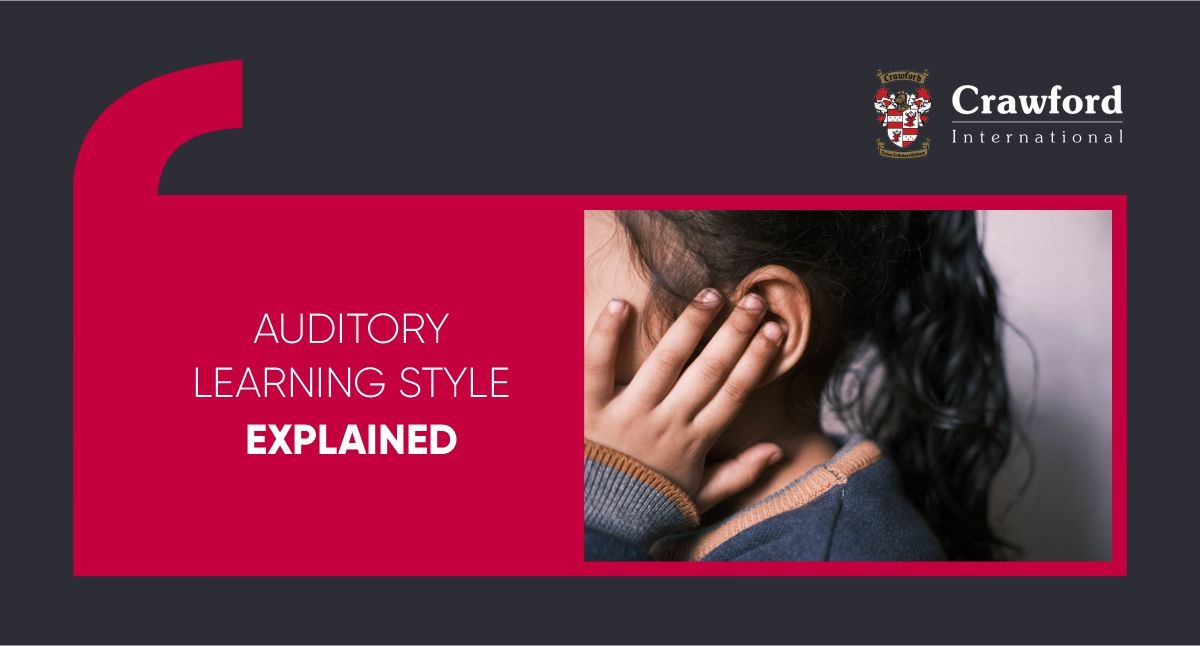Auditory Learning Style
March 1, 2024

A Breakdown of the Auditory Learning Style
One of the pillars of a Crawford International education is a personalised learning journey. Part of that journey involves Crawford’s understanding that students learn in different ways and that quality teaching is most effective when different learning styles are applied in a lesson, to appeal to the different learning styles of the students.
There are four different styles of learning: visual (seeing); kinaesthetic (touching); reading and writing; and auditory (listening). Therefore, lessons that incorporate writing, practical applications (biology dissections), high graphics (colour and flow charts), videos, and music will reach the greatest number of students in a diverse learning class.
In this blog, we will be discussing the auditory style of learning.
What is auditory learning?
Auditory learning involves the process of absorbing and retaining information through audio cues – listening. It refers to the ability to learn by hearing information, understanding that information, and being able to recall that information in a detailed and meaningful way. For instance, a student may remember everything said in a lesson, but won’t be able to remember what was written on a board or in a textbook. That is auditory learning.
Is my child an auditory learner?
Statistics show that more than 30% of the world’s population have an auditory learning style. How do you know if your child is an auditory learner? Here are a few key auditory characteristics that will help you identify an auditory learner:
- Does your child know every word to every song? Or can they recall every word in a movie?
- Can your child tell a great joke? Or are they a good story teller?
- When sharing ideas, is your child able to explain their thoughts well and with meaning?
- Is your child able to communicate well with their peers?
- Are they more popular and often given leadership roles?
- Does your child need music to study or do they like to have the TV on when they are doing a project? Do they struggle with silence?
- Does your child learn by reading their subject content out loud so that they can hear it?
If you have answered ‘yes’ to more than four of the above, your child is most probably an auditory learner.
Advantages and disadvantages of auditory learning
Advantages include:
- Multi-tasking: They learn while listening and doing other activities, such as riding a bike or cooking or doing homework.
- Increased information retention: Auditory learning has a better information retention rate than other learning styles.
- Availability: Technology offers a lot of auditory learning content including videos, podcasts, and audiobooks.
Disadvantages include:
- Distractions: Some say auditory learners can get easily distracted by noises and talking in the classroom environment. What they don’t hear, they won’t learn.
- Disruptive to other learners: An auditory learner who talks out loud to memorise work can be disruptive to other kids in the classroom environment.
- Limited: most schoolwork material is written, so while there are lots of options online for auditory learners, classwork is still deeply rooted in written material, worksheets, and textbooks.
How to learn better as an auditory learner
Understanding your child’s learning style and embracing all the characteristics and advantages of that style, will facilitate a better quality of studying and therefore better overall marks.
Tips to learn better as an auditory learner
- Make sure you can hear every word well in class
- Read all your school work out loud to yourself so you can hear it as well as read it (focus on doing this at home or when you are alone)
- Record yourself learning or reading coursework and then play it back to yourself.
- Find YouTube videos and podcast lessons instead of trolling through written online articles or books
Great extra murals or hobbies for an auditory learner
- Public speaking
- Music – for example marimba band, choir, guitar or piano lessons and even being a DJ
- Drama
- Leadership projects
- Sales-driven activities such as Debs and Squires (selling your products)












